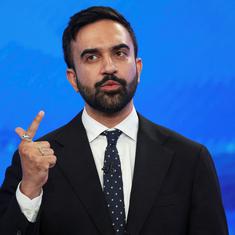Final call on 3-language formula in Maharashtra after talks with stakeholders: CM Fadnavis
The statement came amid opposition to the government’s June 17 order making Hindi a ‘generally’ taught third language in primary schools.

Maharashtra Chief Minister Devendra Fadnavis on Monday said that a final decision on the three-language formula in schools will be taken after consulting all stakeholders, The Hindu reported.
The statement came amid opposition to the state government’s June 17 decision to make Hindi a “generally” taught third language for students from Class 1 to Class 5 in Marathi and English medium schools.
According to the order, if 20 students per grade in a school wish to study any other Indian language, they can opt out of Hindi. If such a demand arises, either a teacher will be appointed or the language will be taught online.
A meeting on the three-language formula was held at the chief minister’s residence on Monday, attended by Deputy Chief Minister Eknath Shinde, School Education Minister Dada Bhuse, Minister of State for School Education Pankaj Bhoyar and education department officials.
The implications of the three-language policy, particularly under the 2020 National Education Policy, were discussed in the meeting, The Indian Express reported.
It was also decided that a presentation be prepared highlighting the state’s linguistic situation to ensure that students in Marathi-medium schools do not face disadvantage.
For this purpose, a consultation process will be held with the stakeholders, including Marathi language scholars, literary figures and political leaders, The Hindu reported.
The Maharashtra government has faced backlash twice over its language policy this year.
On April 16, the Maharashtra government announced plans to implement the 2020 National Education Policy from the academic year 2025-’26.
This made Hindi compulsory as the third language for students of Class 1 to Class 5 in Marathi and English medium schools. This replaced the two-language structure with the three-language formula.
On April 20, a language consultation committee appointed by the state government opposed the decision to make Hindi a mandatory third language in primary schools.
On April 22, the government stayed its April 16 order. The new directive said that while the three-language policy would still take effect, students would no longer be required to study Hindi as their third language.
The three-language formula refers to teaching students English, Hindi and the native language of a state. It was introduced in the first National Education Policy in 1968 and was retained in the new policy launched in 2020.









